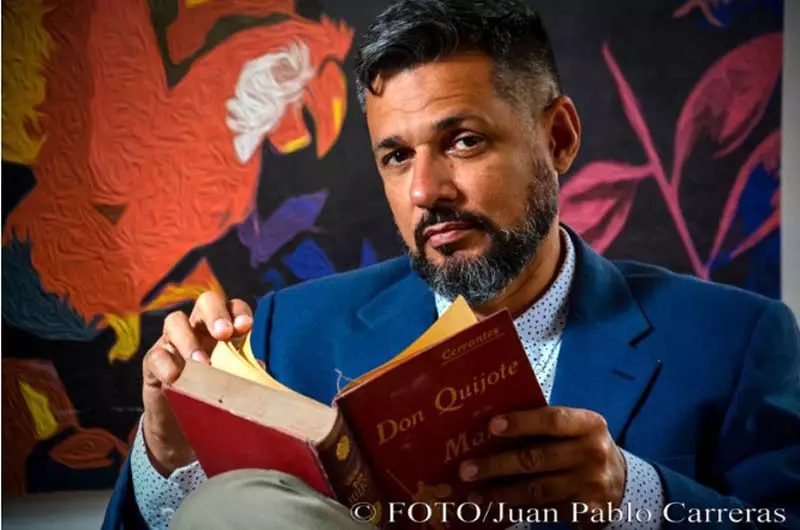Quiet at first glance, Rubén Rodríguez always has a lot to say. First he did it through Journalism, and when he understood that in this he had achieved, technically and formally, what he desired, he climbed the cliffs of literary fiction, through which he advances supported by a solid harness, braided with creativity and perseverance.
The most recent achievement is the Julio Cortázar Ibero-American Short Story Prize, in its 22nd edition. Las codornices, the award-winning work, short in length compared to the standards of the contest, and, in his opinion, simple in terms of structure and plot, “reveals the cruelty of desires – rather whims -, and alludes to the growing sensation of power, that feeling of power of one…”, he tells us, in conversation with Granma.
His work includes literature for adults, and he has several books aimed at children and young people. «In 1999 I wrote Flora y el Ángel, which won the Celestino Short Story Prize. This encouraged me, and when the call for the Holguin City Prize came out, I participated with Eros del Espejo, which contains stories that are connected to later works, and deserved the award, and later I decided to put together a novel for the next edition of the contest. Majá don’t stop horse is the winner. From that moment on, I made it a discipline to write, systematically.
Then his first book for children appeared, Mi mundo, published by Editorial Oriente; and later wrote El carancho de Garabula. «The story was already in the making. It is a bit personal, with realistic content: there is the good person guajiro who wants to be a writer; the antagonist, a plagiarist writer, and other characters. When it was published and widely received, I started the Garabulla series, which has five books so far.
After 2005, other titles appeared, including the series by Leidi Jámilton, linked to more traditional fantasy. «A decade of profuse creation for children and young people is coming, with good reception of these works, whose writing I enjoy very much, in addition to the responsibility it implies from a didactic point of view. “I have never stopped cultivating both modalities, but in certain periods one has greater prominence than the other.”
Editor of the weekly ¡ahora!, jury of important competitions, literary promoter, collaborator of the provincial radio in cultural spaces, university professor… How do you manage to write?
«I sit down to write when I am motivated and I have defined what the story is going to tell. After the storybooks Pintura Fresca (Ediciones Holguín) and Los amores siempre nos duran solo el verano. I felt mature to face the Carpentier Prize, which I won in 2019 with El año que nieve. I think it has been the most “conscious” of my books, in terms of preparation and work discipline.
«I usually start writing in the morning, because I am very “diurnal” when it comes to creating, and I write about ten pages a day, without getting tired. Fatigue negatively affects the quality of the text. Once I finish that creative routine, I take care of household chores and other chores.
Rubén competes “when I have a chance of winning.” But certainty is something else. «Winning the Cortazar confirmed the challenge of attempting greater goals; the challenge of the perennial search for perfection, although it is known to be unattainable; the imperative to resume more complex projects, long on hold; the need to write, write, write…
When talking to him, we heard him say clearly that he believes in good streaks; «However, I prefer the work, the perseverance, the discipline of writing at least one page a day. As someone stated: my inspiration find us working. Although I won the Carpentier on the first try, it was my fifth time sending the Cortazar,” he reveals.
The recognitions have marked the pace of his career. «The awards mean the possibility of printing in a materially depressed context in polygraphy, due to the economic, financial and commercial blockade of the US government.
I had been writing fiction for more than a decade when a publisher asked me for a book for the first time. Therefore, most of my published books come from contests. Prizes always give new energy and help keep the “imposter syndrome” that sometimes appears at bay.
There is so much vehemence in him when he talks about his craft that we cannot help but investigate who he is when he writes. «When I write I am nobody, because I become each and every one of my characters. It is my particular way of conceiving them: canceling myself and letting them inhabit me from their stories and their motives.
With information from Germán Veloz Placencia and Madeleine Sautié, from Granma.cu / Translated by Radio Angulo
- Inder’s 64th anniversary celebrated in Holguin - 22 de February de 2025
- Sport as a driver of values - 22 de February de 2025
- Sultans and Sharks of Trinidad in the semifinals of Baseball Champion Clubs - 22 de February de 2025

